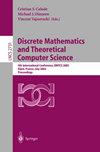加泰罗尼亚:为什么大惊小怪?
IF 0.5
4区 数学
引用次数: 14
摘要
与有限Coxeter系统相关的非交叉加泰罗尼亚组合学的主要对象是非交叉分区、可排序元素和簇复合体。第一种和第三种是已知的fuss - catalalan概括。我们为这些提供了新的观点,引入了可排序元素作为正Artin单群中的元素的相应推广,并展示了该观点如何将所有三种推广联系在一起。本文章由计算机程序翻译,如有差异,请以英文原文为准。
Cataland: Why the Fuss?
International audience
The main objects of noncrossing Catalan combinatorics associated to a finite Coxeter system are noncross- ing partitions, sortable elements, and cluster complexes. The first and the third of these have known Fuss–Catalan generalizations. We provide new viewpoints for these, introduce a corresponding generalization of sortable elements as elements in the positive Artin monoid, and show how this perspective ties together all three generalizations.
求助全文
通过发布文献求助,成功后即可免费获取论文全文。
去求助
来源期刊
自引率
14.30%
发文量
39
期刊介绍:
DMTCS is a open access scientic journal that is online since 1998. We are member of the Free Journal Network.
Sections of DMTCS
Analysis of Algorithms
Automata, Logic and Semantics
Combinatorics
Discrete Algorithms
Distributed Computing and Networking
Graph Theory.

 求助内容:
求助内容: 应助结果提醒方式:
应助结果提醒方式:


